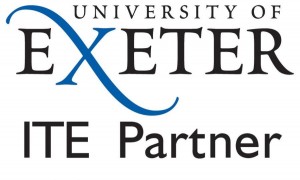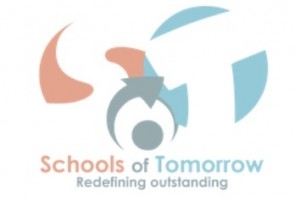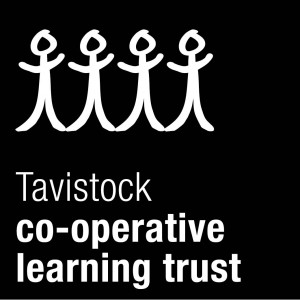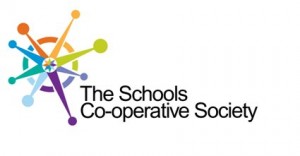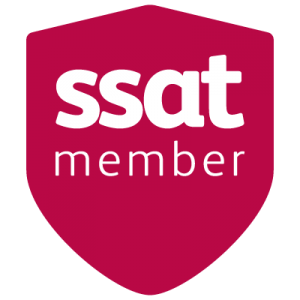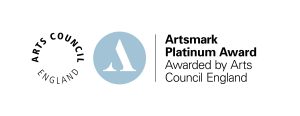With immediate effect and in accordance with Dartmoor MAT policy, the college will be monitoring all student online activity involving school owned devices (laptops, Chromebooks , PCs etc) that are used in conjunction with school based IT accounts for safeguarding and child protection purposes. The monitoring system we have adopted is the “Smoothwall” system. There will be no monitoring of personal or android devices at the current time. Further information can be found by clicking on the following link;
If you have any further questions relating to the associated safeguarding matters please contact Barbara Manning the school’s Designated Safeguarding Lead (DSL) at the college. Alternatively technical questions can be directed to itsupport@tavistockcollege.org
The full return to school by all of our students has been something to be proud of. As would be expected at Tavistock College, all colleagues have pulled together to ensure that the carefully crafted LFT plan and relational policy have been implemented without too much difficulty. We have quickly been able to adapt to immediate needs without any major complication. Thank you to everyone who has made this happen. The small, incremental and, seemingly, trivial actions have all added up to one massively positive school to be in right now.
There has certainly been a buzz of excitement about the place. The conversations with staff demonstrate how much we have missed each other, and, of course, the young people in our care. Jo Neill said to me the other day “It’s not that we haven’t all been working, it’s that we have not been working together that has made me tired”. We now have an opportunity to put this right, and bring alive our exceptional ethos once again. In taking the time to talk to students this week, I know that they are understanding of the need to maintain the health and safety controls, and are supportive of what you are all doing for them. Whilst the return to their academic and vocational studies is high on the agenda, the minds of most of my Student Voice group are full of socialisation, their friends, their families and their worries. Tutors have time to manage conversations over the next two weeks to allow for powerful discussions around social needs alongside the tutor programme. It is a wholly human trait to want to re-connect, and we should not shut opportunities down.
All of this is really about seeing life through the eyes of others. We already know that what a teacher thinks is happening in the minds of their students, and what is actually happening in the minds of their students may be two very different things. The teacher may think that everyone is on the same page, with the same understanding of what has been explained, but the truth is very different. Part of the art of teaching is to try and get everyone to see what is inside their own head, so that everyone can then think about the same thing together. What happens in the classroom after all, is a communal act, and it should be highly dialogic. If we want to be able to work together in a classroom and get to the point where there is meaningful discussion, we have to begin by making sure that people have the knowledge to enter that dialogue. That is why recent professional development has intentionally revisited retrieval, modelling, chunking, scaffolding and ‘just in time’ feedback. The return to face to face learning, therefore, will continue to require ongoing attention in these areas.
We are still in transition. As in all things in life that change, one thing does not just end and another begin. Life is a collage of beginnings and endings that run together like still-wet paint. Yet before we can begin any new phase in the life of the school, we must sometimes first achieve closure to the current stage we are in. That is because many of life’s experiences call for closure. Often, we cannot see the significance of an event or importance of a lesson until we have considered the changes that we might make, for example in recognition of the lockdown. It is this sense of completion that frees us to open the door to new beginnings. There are plenty of new practices and systems that we can now reflect upon and decide which actions to now put our efforts into. If we pay attention to the values that we have built this school upon we will not go far wrong. They are, after all, expectations about our behaviours and relationships, not words on the wall.
Despite the all-absorbing return plan, we still found time this week to promote International Women’s Day. It is important to recognise that when we choose to consider issues of equity and equality that we are not acting in a way that promotes only lip service. Students will never forgive us for that. To be specific, it is not acceptable to pose for a picture with your hand raised, and then engage in ‘banter’ about feminism. Feminism is not an ‘anti-male’ stance. To quote G D Anderson (founder of the Cova Project) “Feminism isn’t about making women strong. Women are already strong. It’s about changing the way the world perceives that strength.”
Whilst we accept that all people have their own way of being in the world, there must always be an expectation that our behaviour around issues of equality and equity will never be to the detriment of others. In other words, it must be authentic. We grow up in different environments, affected by a unique range of influences. The preferences, values, and beliefs we embrace are frequently related intimately to our origins. Additionally, the need to individualise our experiences is instinctive, as doing so enables us to cope when we must face challenges on our own. Consequently, each of us has developed a perspective that is uniquely ours. Interacting peacefully and constructively with people from all walks of life is a matter of first understanding where they are coming from, accepting it and then championing the changes in ourselves. Then we can adjust our expectations so that we avoid making undue assumptions and judgements about what they are about. When there are barriers keeping us from connecting with someone else, it is possible to think of questions you can ask them to gain a more thorough understanding of their point of view. We may discover that in addition to the differences in perspective dividing us, we are subject to insecurities and other personal issues that influence our way of seeing the world. It is likely that we will never fully grasp the myriad complexities embodied by humanity, but we can go a long way toward encouraging mutually satisfying relations by reaching out to others in the spirit of sympathetic comprehension. I believe that this is exactly what we must do as we move forward.
On Monday 8th March we are starting to welcome back our students to College. This has been staggered to ensure students are Lateral Flow Tested before they return to lessons. We hope this flow chart offers some clarity with this process.
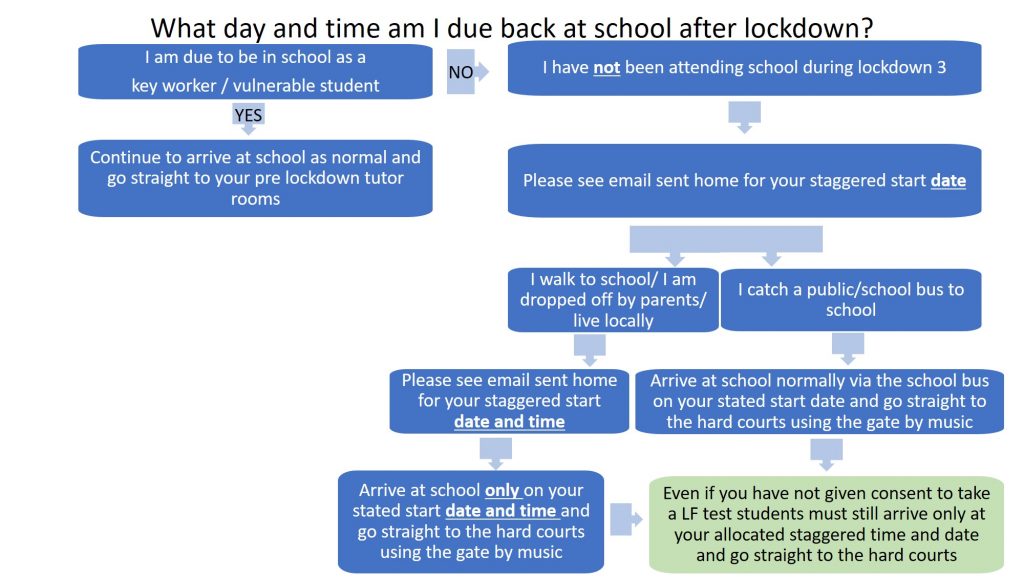
The ‘roadmap out of lockdown’ schools announcement made by the Prime Minister on 22 February came as no surprise. We have been anticipating, and planning for, the return of students to full time learning for a few weeks. Assuming that the data provided about our health and safety is accurate, I certainly support the full opening of schools from 8 March. No matter how hard teachers have worked at providing remote learning, nothing can replace the face to face interaction between teachers and students, and students with students. Certainly not in a highly dialogic school like ours. Returning to school is vital for children’s education, and their wellbeing. Time out of school is detrimental for children’s cognitive, social and academic development, particularly for those who are disadvantaged. Yesterday I circulated to you all the opening plan strategy documents and the updated generic risk assessment for Tavistock College. Please take some time to read these. There are significant changes to the September opening plan, and it is incumbent upon everyone to follow the risk assessments that are in place.
Young people will not, of course, just slot back into classrooms and learn en mass easily. The return in September showed us that. We know from evidence provided by the NHS and our health support services that the decline in mental health amongst 14-18 year olds has been more dramatic during this lockdown than in the previous ones. School closure will have contributed to that. The work in bringing our students back, therefore, must be thoughtful and empathetic. The ethos we promote together will matter because students are returning to a very different set of expectations than they have been used to in recent weeks. The opening plan asks you to consider how you will behave and what you will do to support this transition. We have to operate as one team.
From my perspective, the action of seeking to understand before we act is at the core of this. Listening matters, and students want us to take into account the struggles and successes they have had over lockdown with remote provision. That is what our student voice meetings were largely about last half term. In addition, we have responsibility to support parents with the transition back to school. We have developed some superb strategies to effect this during lockdown, and we will grow them going forward. I do not want to lose momentum in this important area.
Wellbeing, after all, is everyone’s responsibility. If we get what is written in the opening plan right, we will not simply be surviving a difficult and sudden return to full time face to face teaching, rather we will be thriving and improving in every area. I made my expectations very clear to Heads of Faculty yesterday, and I am sure you will be able to discuss these at your faculty development time next week. The determination to rebuild our cooperative approach is non-negotiable, but how you get here is in your gift.
Of course, as human beings, we cannot help but be subject to our preferences. We do, though, have control over the manner in which these manifest themselves in our professional behaviours. Every idea we hold dear is an expression of either support or opposition, and it is our perspective that determines whether we are for something or against it. Now, more than ever is a time to be positive. We can direct our energy and intentions into activities that promote wellbeing (and kindness) rather than using our resources to speak out in opposition to troublesome behaviours and attitudes. On the surface, these appear to be two interchangeable methods of expressing one virtue, yet being ‘for’ something is a vastly more potent means of inspiring change because it carries with it the power of constructive intent.
Recent examples of this include the work we have started (thanks to Chloe Carrubba) for International Womens Day and for the LGBTQ history month (thanks to Nick Read and Neil Hosking). Both have been celebrated in this school. When you support a cause, whether your support is active or passive, you contribute to the optimism that fuels all affirmative change. Optimistic thoughts energise people, giving them hope and inspiring them to work diligently on behalf of what they believe in. Being ‘for’ something creates a positive shift in attitude, which means that neither you nor those who share your vision will have any trouble believing that transformation on a grand scale is indeed possible. To be ‘against’ something is typically easy, as you need only speak out in opposition to it. Standing up for something is often more challenging, because you may be introducing an idea to people that may scare them profoundly.
Throughout our lives we are often told that the actions of one person will seldom have a measurable impact on the world. Yet your willingness to stand up for what you believe in instead of decrying what you oppose can turn the tides of fate. The thoughts you project when you choose to adopt a positive perspective will provide you with a means to actively promote your values and, eventually, foster lasting change. That is why I nurture, uphold and promote the values of the International Co-operative Alliance. We have the chance to transform our school over the next few weeks by being positive, constructive and malleable to the needs of others. Cooperation gives us the capacity to bend without breaking, as well as a continual willingness to change or be changed in order to accommodate new circumstances. This enables us to take advantage of opportunities that a more rigid and determined approach would miss out on.
Thank you all for your work so far this term. We are about to launch ourselves forward into a new, not old, phase of our work. Let’s do this together, and enjoy the experience.
Have a lovely weekend





